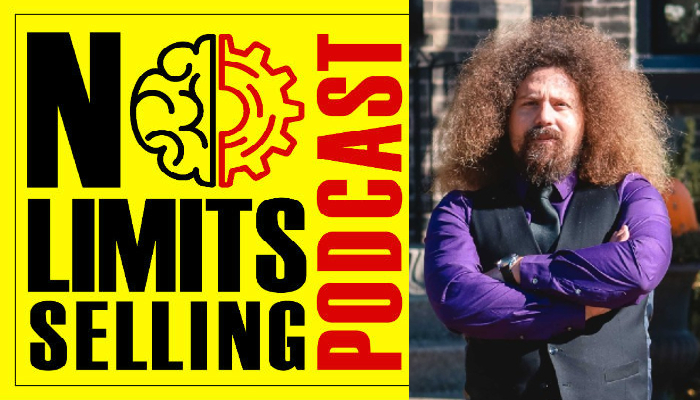How To Be An Excellent Team Player
On Episode 227 of The No Limits Selling Podcast, we have Joshua Wall, REALTOR® at The Crew Real Estate. Joshua Wall is a REALTOR® who loves to be a part of his clients' adventures in real estate. Every sale is its own journey and he takes pride in helping people start a new chapter. He's proud to be an integral part of the process -every step of the way. In this episode, Joshua shares with us tips on how to be an excellent team player.
Joshua is also a Brantford City Councilor for Ward 5 (Downtown/East Ward/Eagle Place). He is hyper-passionate about his hometown and can often be found loudly proclaiming what makes Brantford and its citizens so amazing. He places communication and education at the forefront of the way he wants to serve his term on the Council.
Locally he also acts as a host, promoter, emcee, and/or volunteer of various events related to raising funds for community nonprofit organizations. Joshua often participates in events related to the support of arts, history, culture, and heritage in Brantford/Brant.

Contact Joshua:
[EDITOR’S NOTE: This podcast is sponsored by No Limits Selling. It is a fun, fast-paced podcast that delivers hard-fought business advice that you can implement today to improve your sales and performance]
Interested In Our Real Estate Coaching Services? Explore Our Website: Link
Feeling Not Well Today? You Can Use Our Mindset Boosters App To amp Up Your Mood: Link
Find us on Social Media:
LinkedIn | Facebook community | Instagram
Like what do you listen to? Subscribe to our podcast!
Ready to become fearless? We can help you become fearless in 60 days so you accomplish more in your career Schedule A 15 min Call with Umar
Summary
Introduction
The podcast begins with an introduction of Joshua Wall, who is a successful entrepreneur and business leader. He is the CEO of a company that specializes in providing high-quality products and services to its customers and helps each of his employees to become an excellent team player. The host of the podcast, Umar Hameed, introduces Joshua and sets the stage for the conversation.
Joshua's Background and Early Life
Joshua shares his background and early life experiences. He talks about his upbringing, his family, and how his early experiences shaped his outlook on life and business. He discusses the challenges he faced and how they helped him develop resilience and determination.
Career Journey and Achievements
The conversation then shifts to Joshua's career journey and his achievements. He talks about his first job, the lessons he learned, and how he progressed in his career. He shares stories about his successes and failures, and how being an excellent team player himself contributed to his growth as a business leader.
Leadership Philosophy and Approach
Joshua discusses his leadership philosophy and approach. He believes in leading by example and empowering his team members. He talks about the importance of communication, trust, and respect in building a strong team and the same virtues for individual employees to become an excellent team player. He also shares his thoughts on decision-making and problem-solving.
Challenges and Overcoming Obstacles
The podcast delves into the challenges Joshua has faced in his career and how he overcame them. He talks about dealing with setbacks, managing stress, and staying motivated. He shares his strategies for overcoming obstacles and turning challenges into opportunities for growth.
Future Plans and Goals
Toward the end of the podcast, Joshua talks about his future plans and goals. He discusses his vision for his company and his personal aspirations. He also shares his thoughts on the future of the industry and the role his company will play in it.
Conclusion
In this insightful podcast, Joshua Wall, a successful entrepreneur and business leader, shares his life journey, career progression, and leadership philosophy. He discusses his early life experiences and how they shaped his business outlook, emphasizing the importance of resilience and determination. Joshua's leadership approach is centered around leading by example. He believes that to be an excellent team player, it is important to foster communication, trust, and respect within your team. He candidly discusses the challenges he's faced, his strategies for overcoming obstacles, and how he turns setbacks into growth opportunities. Looking ahead, Joshua shares his vision for his company and the industry, as well as his personal aspirations.
The podcast concludes with Joshua imparting advice for aspiring entrepreneurs, underscoring the significance of hard work, perseverance, and a positive attitude. This podcast offers a deep dive into Joshua's experiences and insights, providing valuable lessons for both budding and established business leaders.
Questions & Answers
Who is Joshua Wall?
What is Joshua Wall's background and early life like?
What has Joshua Wall achieved in his career?
What is Joshua Wall's leadership philosophy?
How has Joshua Wall overcome challenges in his career?
What are Joshua Wall's future plans and goals?
What advice does Joshua Wall have for aspiring entrepreneurs?
Don’t miss this opportunity to transform your real estate career with one-on-one coaching. As an experienced real estate coach, I, Umar Hameed, am dedicated to helping you unlock your full potential and achieve your real estate goals. To learn more about who am I and my clients ↓
If you’re ready to take the next step, book an appointment with me today and begin your journey toward success in the real estate industry.

